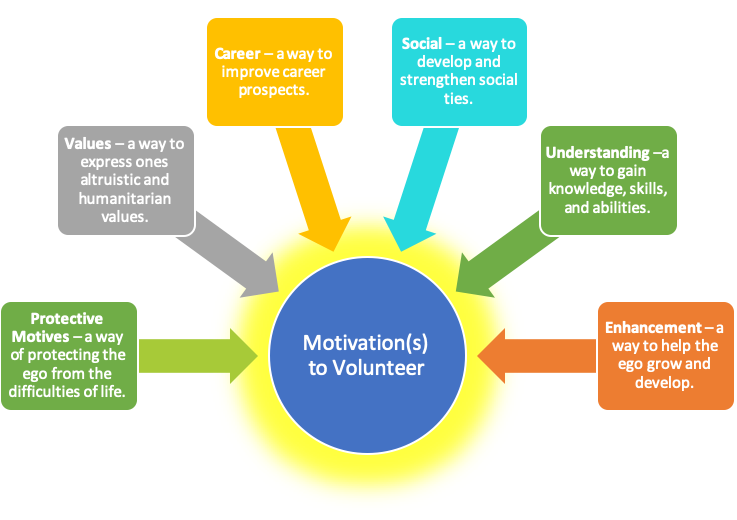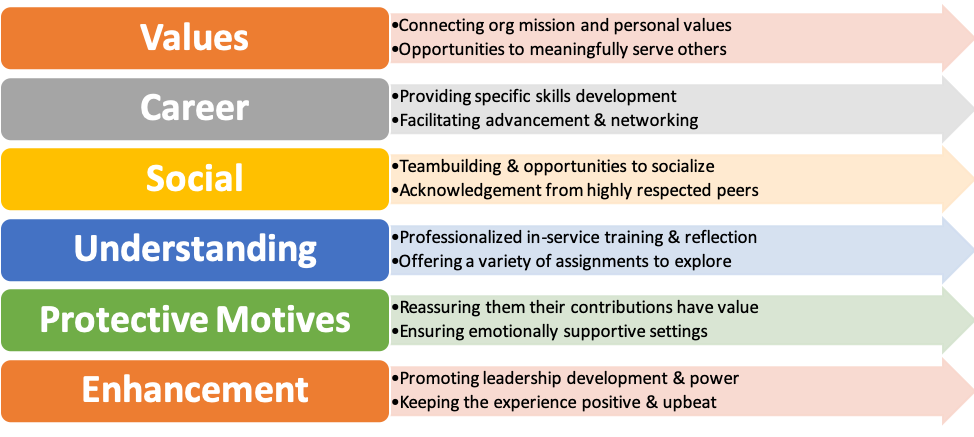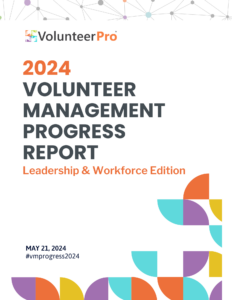
Chapter 7: Volunteer Appreciation
Volunteer appreciation is important to show that you value a volunteer’s commitment and effort. It can come in many forms:
- a simple verbal acknowledgment for great work
- formal thank-you note
- an organized volunteer appreciation event
- a volunteer awards ceremony
- or, promotions to volunteer leadership positions
It plays a big part in increasing volunteer retention, builds trust, and strengthens staff-volunteer relations.
When considering volunteer appreciation, nonprofits should understand both the intrinsic and extrinsic factors that motivate people. Examples of extrinsic factors include:
- Earning a stipend or bonus
- Avoiding admonishment or punishment
- Receiving praise or instant gratification
- Winning a contest
- Getting a reward, such as a plaque, certificate, or gift
While extrinsic factors are often what the world relies most on, intrinsic factors are actually more effective and are longer lasting. They include:
- Challenge – Being able to challenge yourself and accomplish new tasks, or reflect on why something did or did not work
- Control – Having choice over what you do
- Cooperation – Being able to work with and help others
- Recognition – Receiving meaningful, positive acknowledgment for your work
For nonprofits, it’s important to offer a blend of both, while keeping in mind that greater volunteer satisfaction, engagement, and longer-term retention will ultimately be dependent on the mastery of the management of the volunteer program.
This chapter will give you ideas on how you can best recognize your volunteers based on their motivations. We’ll provide specific ideas that satisfy both intrinsic as well as extrinsic factors including how to develop a volunteer leadership pathway, create memorable recognition events for any type of budget, use thoughtful language in your volunteer thank you letters, and gather and use feedback that promotes volunteer retention.
Start with Gratitude
Showing volunteer appreciation begins by fostering a culture of gratitude. Imagine an environment where everyone felt appreciated. How would people be treating one another? How productive would people be? How would the work reflect onto their clients?
Studies have shown that simple expressions of gratitude directly affect productivity. It also increases the effectiveness of our decision-making by increasing our levels of patience and help us cope. Research shows that giving thanks lowers daily aggression, hurt feelings, and overall sensitivity. According to psychologist Robert Emmons, “Gratitude builds up a sort of psychological immune system that can cushion us when we fall…[T]here is scientific evidence that grateful people are more resilient to stress, whether minor everyday hassles or major personal upheavals.”
So how do you begin? Gratitude starts with the leader. As leaders, volunteers need to hear “thank you” from you and other managers first. That’s because expressing gratitude can make some people feel unsafe, particularly in a workplace with a history of ingratitude. So make sure your peers and other staff are on board with the concept and do their best to instill these practices.
Here are some other ideas of how to foster a culture of gratitude:
- Be specific about the benefits of a person, action, or thing when providing positive feedback
- Create different opportunities for gratitude, large & small
- Work with volunteers to build team norms that build collegiality
- Set up regular rituals that everyone recognizes as part of a culture of giving thanks
Simply put, if volunteers are feeling appreciated often, they will be motivated to stay with the organization and find deeper ways to support your mission. If they feel unappreciated, they will leave.
The Six Big Volunteer Motivations
Another way to look at retention is through functional theories about the reasons, purposes, and motivations underlying human behavior. Researchers have identified six personal and social functions potentially served by volunteering. These functions may impact decisions about becoming a volunteer in the first place but also about continuing to volunteer. See the Volunteer Functions Inventory below.
Functional Motives for Volunteering

This research is also supported by several assumptions we hold about volunteer motivations:
- People are purposeful, planful, goal-directed – Volunteers engage in volunteer work in order to satisfy important personal goals
- Different people may do similar things for different reasons – Volunteers may have different reasons for volunteering
- Any one individual may be motivated by more than one need or goal – An individual volunteer may be attempting to satisfy two or more motives
- Successful outcomes depend on the matching of needs and goals to the opportunities to the volunteer – Successful volunteer recruitment, satisfaction, and retention is tied to the ability of the volunteer experience to fulfill the volunteer’s motives
Below are suggestions for ways you can align volunteers’ motivations with appreciation activities and intrinsic rewards.

Meaningful Volunteer Appreciation and Rewards
Volunteer recognition can come many forms, all of which would be meaningful to volunteers based on their motivations. And most of them can be done with low to no cost. Here are examples of the types of rewards you can offer.
Rewards in the form of:
Publicity – Creating a board or poster of acknowledgments and displaying them in a public place is a way to recognize volunteers’ contributions on a daily basis and builds a sense of community. This can help increase accountability of volunteers and board members by demonstrating to all what they are responsible for. You can also highlight case studies and success stories where your volunteers have been involved through your newsletter, marketing materials, or in publications.
Power – Think about ways you can show recognition by providing volunteers with a sense of influence. Are there ways you can recognize them on your web page? Perhaps they would be a great speaker to talk about their experiences at a conference or event. Perhaps their input would be welcomed at a prominent meeting with staff. While these may seem like strange recognition ideas, they can actually go a long way to making a volunteer feel valued.
Responsibility – Increased responsibility would be perceived as a reward only if the proper support accompanies it. Make sure you are able to provide the right training, resources, and supervision. That way, volunteers will believe they will be able to make a difference.
Training – Providing volunteers with training that enhances their KSAs is usually welcomed. Match volunteers with “learning roles.” Coordinate continuous learning opportunities throughout the year for them. Offer in-service trainings (led by volunteers and professional staff). Promote informal learning (peer mentoring, online communities, DIY document portals, recorded videos/webinars, etc.). Help volunteers earn college credit for life experience or offer Continuing Education Credits (CEUs)
Food: Who doesn’t love to eat? Free food is always a crowd pleaser. Throw an ice cream social, pizza party or just have tasty snacks available during shifts. You can ask community businesses and local experts to donate food if it’s for an event.
Events: You can also hold low-cost events to recognize your volunteers. Here are some ideas:
- Site/Location – Pick unique (e.g., city park) or symbolic locations (e.g., civil rights museum)
- Speakers & Guests
- Try to tell success stories (challenges that resulted in triumph)
- Make space for expressions of appreciation between volunteers
- Ask those who have benefited from the volunteers’ work
- Invite spouses or families and thank them, too
- Program/Activities – Read thank you notes from clients aloud
- Create opportunities for vols to view themselves as those helping humanity (e.g. make a donation on their behalf)
- Individualize acknowledgments (comments, notes, name tags, table tents) as much as possible (specific/aligned with key volunteer motivations)
- Provide a “state of the organization” update & “sneak peeks” of the future
- Get input on a proposed initiative
- Include in-service training on topics of high interest to volunteers
- Include time for reflection of the meaning of their work
- Make space for socializing & “supported” networking & teambuilding
Thank You Notes
Whether you are sending an informal note, writing a formal appreciation letter, or preparing comments for a celebration, writing a meaningful thank you is a critical skill.
Most volunteers understand how busy you are, and just taking the time to personally thank them will make them feel valuable. Receiving a handwritten note in the mail is increasingly rare and for some, your card will put a smile on their face for their entire day.
Volunteers will also appreciate your efficient use of resources. Many volunteers don’t want nonprofits to spend their limited resources on plaques, pins, or other gifts.
Here are four simple steps to writing a powerful thank you note.
Keep it simple and create a habit of writing thank you notes. You do not have to do this every day. Simply jot down 3-5 people you want to send a note to each week. Consider including volunteers, community partners, and co-workers.
Step 1: Focus on Excellence – Thank them for something they have done that was valuable or beyond the call of duty. Be specific.
Step 2: Connect the Dots – Describe how it has helped the program achieve a goal or the organization achieve its mission. Tell a story.
Step 3: Acknowledge the Effort – Recognize that volunteering (or helping you as a partner or co-worker) takes sacrifice of personal time.
Step 4: Make It Personal – Share what the person’s support and contributions have meant personally to you.
The Value of Volunteer Feedback
Gathering feedback from volunteers is also a smart volunteer appreciation strategy. Asking for regular feedback, and acting upon it, helps volunteers understand that they are valuable partners in mission success.
Regular feedback also helps you assess how well your programs are running, how happy your volunteers are, and what you can do to make the program better. We suggest conducting a 30-day and annual survey along with exit interviews to gather feedback on your program.
30-day New Volunteer Survey
The focus of this survey is to check in with volunteers about their early impressions and about their experience with your organization. This survey identifies any issues volunteers are encountering early on to give you a chance to rectify them and ensure long-term retention.
This survey should be administered 30 days after the volunteer has completed their first regular shift. The survey might be delivered through a web-based survey tool or on paper if they prefer. Ideally, a link to the questionnaire should be sent to active volunteers through email or your volunteer management system.
What to include:
- A section on the volunteer’s experience. Include statements volunteers can rate on a Likert scale about whether the assignments are meaningful, if they have the resources and training they need to do their jobs effectively, if they feel supported, etc. Would they recommend the program to someone else? Why or why not? What is their overall satisfaction with their volunteer position? Leave room for comments.
- A section about themselves. Find out what volunteer position they are in, gender, ethnicity and anything else you might find helpful to make distinctions about whether satisfaction depends on certain factors.
- A question on what improvements they suggest to make the program or volunteer experience better.
Annual Volunteer Survey
The focus of this survey is to determine the quality of your organization’s volunteer experience. If possible, this survey should be administered each year to active volunteers. This survey asks volunteers to comment on key aspects that research has determined drive volunteer satisfaction and retention.
What to include:
Include similar information to what was asked in the 30-day survey but add a section on what inspires the volunteer. Include statements volunteers can rate about what motivates them like working for a cause, learning new skills, having something to put on their resume, or making new friends. You will also want to ask them if they would be interested in taking on more responsibility.
Volunteer Exit Interviews
The purpose of the volunteer exit interview is to better understand why the volunteer has decided to leave. An exit interview is the most accurate instrument in identifying issues or program improvements that need attention. Volunteer participation in exit interviews should be voluntary.
The information you gather during the interview can be reviewed later for data on trends and/or ideas about how to recognize and motivate other volunteers to keep them retained. An aggregate of anonymous results should also be kept in a spreadsheet and included in quarterly or annual reports.
You can ask questions such as:
- How long have you volunteered with us? What type of volunteer position did you hold?
- What did you like about your volunteer experience? What did you not enjoy or bothered you about it?
- Why did you decide to end your service with us? What was your main reason for leaving?
- If your experience did not live up to expectations, did you take steps to communicate your issue(s) with your team leader or other staff? What did they do to resolve the problem?
- Were you trained adequately for your role(s) and responsibilities? If not, what other training or support would have been helpful?
- Were there tasks you were expecting that were not assigned? What were they? What didn’t go as planned?
- What can we do to improve support of volunteers and services to our customers?
As you can see, volunteer appreciation can take many forms. The bottom line is that volunteers’ motivational and emotional needs are met, that they feel included and integrated into your team, and that they feel they have a say on management decisions that directly affect them. If you cover all of these bases, you will be sure to keep a talented corps of volunteers coming back to support you over and over again.

